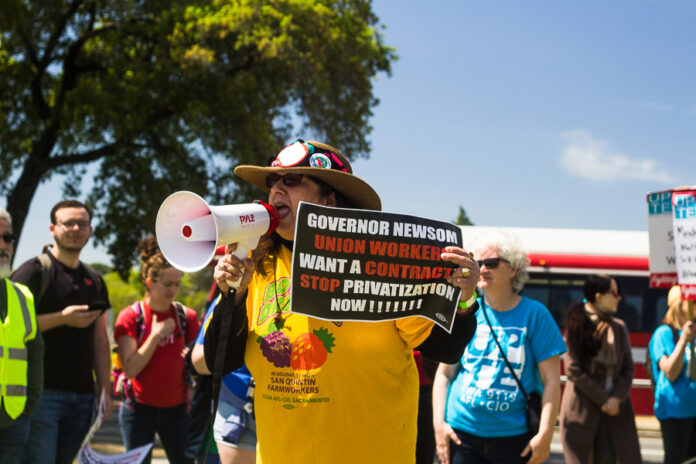Complaint filed accusing UC of bribery, instilling fear and coercion to break union lines By ALLY RUSSELL — campus@theaggie.org
39,000 UC workers participated in a state-wide picket line and strike on April 10 to protest unfair working conditions, alleged instances of worker intimidation, outsourcing of jobs and the UC’s failure to meet contract bargaining demands. This is the fourth strike organized by AFSME Local 3299 in the past year.
AFSCME union representatives have been engaged in contract negotiations with UC representatives throughout the last two years but have failed to come to any acceptable agreements for both parties.
Service and patient care workers across five UC medical centers participated in a one-day Union Labor Practice strike after filing an official charge of illegal conduct against the university, claiming the university unlawfully interfered with workers’ rights according to a press release.
The complaint filed with the Public Employment Labor Relations Board includes allegations of UC representatives offering incentives for union workers to cross picket lines, instances of instilling fear into union members, UC supervisors bribing union members and other listed complaints.
Picket lines were held at the UCLA, UCSF, UCD and UCI Medical Centers as well as several UC campuses.
Strike efforts have garnered national news, gaining the attention of senator and presidential candidate Bernie Sanders who joined the UCLA union workers’ strike in solidarity three weeks ago. Sanders spoke to the crowd at the medical center, expressing his outrage at the UC’s treatment of its workers.
“I’m here today not as a candidate for president but as somebody who has spent the last 40 years of his life walking the picket lines for unionized workers,” Sanders said in a press release.
At UC Davis, students in solidarity with strikers participated in a rally at the Memorial Union. Students led chants as the group moved through the Coffee House to join workers picketing on the corner of Russell Boulevard and Howard Way.
Sam Howell, a student organizer and second-year plant sciences and neurobiology, physiology and behavior double major, helped organize students outside the Memorial Union.
“I’m just a student trying to show solidarity,” Howell said. “These workers are literally the people who make the university run on a day-to-day basis.”
Workers represented by AFSME include service workers, patient care workers, technical workers, skilled craft workers, non-academic service workers as well as clerical and professional staff.
Raquel Navarro, a third-year sustainable agriculture and food systems major, was also involved in organizing the student rally.
“As students, we invest a lot of money in this university, so we have a lot of leverage when it comes to trying to demand respect and dignity for students and workers alike,” Navarro said to a crowd of onlookers.
Navarro, along with fellow speaker Genessis Garcia, a third-year economics and human development double major, rallied the crowd of students, explaining to onlookers why workers were striking and students were standing in solidarity.
“These workers support our community, they feed us, they take care of us,” Garcia said. “AFSME 3299 workers are 85% women, immigrants and people of color, so this fight is not just about economic equality; it’s about racial and gender equality. These are the lowest paid workers on our campuses.”
According to strike organizers, black female workers are the lowest paid demographic of UC employees. Speakers repeatedly referenced the statistic that it takes six years on average for black women employed by the UC to achieve the starting salary of white men hired for the same positions.
While UC representatives have offered union workers raises of 3% and raised the minimum wage to $15 an hour, without adequate coverage and benefits, union workers have rejected UC offers.
Even at a $15 an hour minimum wage, workers employed full time would still not earn enough to afford a one-bedroom apartment, according to the National Low Income Housing Coalition’s annual report. In California, workers earning the current minimum wage would have to work 93 hours a week to afford a modest, one-bedroom rental home.
Moreover, wage discrepancies between UC service workers and chancellors are growing increasingly disparate. As of 2017, UC Chancellor and President salaries ranged from $495,000-$531,000 a year, according to a report published by the University of California. At $15 an hour, union workers employed full time would only earn $31,000 a year.




